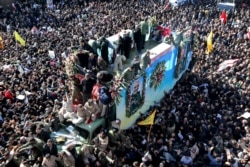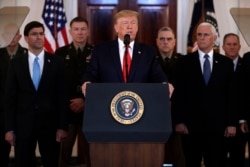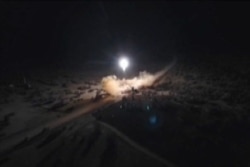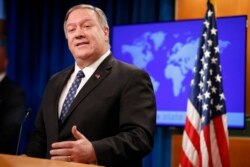The foreign ministers of Europe’s four leading powers met in Brussels Tuesday to try to find a way to ease growing tensions in the Middle East just hours before Iranian missiles struck two military bases housing U.S.-led coalition forces in Iraq.
As Washington and Tehran continued to trade barbs in the wake of the U.S. slaying of Iran’s top general, Qassem Soleimani, Britain’s foreign secretary, Dominic Raab, told reporters, “What we are looking to do is is to de-escalate tensions with Iran.” But when Raab and his colleagues exited their meeting, they weren’t any clearer about what steps to take to defuse the most dangerous confrontation between the U.S. and Iran in four decades.
On Friday, foreign ministers from all 28 European Union countries will gather in the Belgian capital to thrash out a common strategy, but with a little more hope than before — the televised remarks by U.S. President Donald Trump Wednesday have offered the chance, they say, that confrontation between the U.S. and Iran can be defused and an all-out war averted.
They just hope Iran will grasp the opportunity and refrain from any more military action.
For European leaders, it has been an emotional roller coaster week. The U.S. drone strike Friday that killed Qassem Soleimani came with no warning from Washington. They were scolded by U.S. officials Sunday for not being more forthright in support.
Their gloom only deepened Tuesday when Iranian ballistic missiles slammed overnight into the Iraqi military bases.
And their anxiety increased when Iran’s supreme leader outlined his war aim — to get the United States to withdraw from the Middle East. Ayatollah Ali Khamenei appeared to suggest that the missile attack, which he dubbed “a slap in the face” for America, would just be the start, saying “military action like this is not sufficient.”
But the lack of any immediate military response by Washington to Iran’s ballistic missile barrage — as well as President Trump’s remarks Wednesday — have given them hope that the immediate crisis hasn’t reached the point of no return. That is as long as Iran refrains from further military attacks on U.S. bases.
“We suffered no casualties. All of our soldiers are safe,” President Trump said in his address from the White House. Noting that only minimal damage was sustained at the bases, Trump continued: “Iran appears to be standing down, which is a good thing for all parties concerned and a very good thing for the world.” He said Iran should work with the United States on “shared priorities,” such as the fight against the Islamic State terror group.
In Europe, President Trump's comments were being taken as a sign that he now wants to pursue a diplomatic path, offering the possibility that negotiation can stop the slide into all-out war.
Relief though was mixed with alarm at the U.S. President’s insistence that the 2015 nuclear deal was now dead and a replacement needs to be negotiated. There was also puzzlement at Trump’s talk about additional sanctions being imposed on Iran, with analysts questioning what more can be sanctioned?
Now the ball appears in Iran’s court, say EU officials. “Trump offered an olive branch and a warning. He’ll impose new sanctions and they must stop their aggression, but he held out the prospect of negotiating a new nuclear deal, and he signaled clearly the U.S. was not seeking to launch a war with Tehran — or change the regime. Let’s hope they grasp the olive branch,” said a British official.
One hopeful sign came from influential Iraqi Shi’ite cleric Moqtada al-Sadr, who suggested the crisis is now over following what he termed de-escalation rhetoric from Iran and the U.S.. He urged Iranian-backed militia groups to refrain from further attacks on U.S.-led coalition forces. Sadr has positioned himself as an Iraqi nationalist, and isn’t in the ‘Iranian camp,’ but he is well-equipped to read Tehran and what it intends.
William Patey, a former British envoy to Iran, told Britain’s Sky News that the crisis may be entering “a de-escalatory phase,” thanks to the fact that there were no U.S. casualties from the Iranian missile barrage.
European leaders have felt like bystanders since the crisis started.
In the first 24 hours after the drone strike that killed Soleimani, America’s European allies were slow to express support for the U.S., reflecting a continuing rift in transatlantic views that has only widened since May 2018, when the Trump administration walked away from a landmark international nuclear deal with Tehran struck when then-U.S. President Barack Obama was in office.
The Europeans have preferred to approach the Iranians with carrots and incentives to try to get Tehran to show restraint; the Trump administration has favored the stick, arguing carrots have not worked.
It wasn’t until Sunday that the key European leaders, British Prime Minister Boris Johnson, German Chancellor Angela Merkel and French President Emmanuel Macron, managed to craft a joint statement, urging restraint by both sides, but criticizing Iran for malign behavior.
They failed to endorse explicitly Soleimani’s killing, but Johnson is widely credited by diplomats as having been crucial in persuading his counterparts to toughen the statement and to express clear criticism of Iran. Since then, European governments have sought to catch up with the fast-moving events — a key aim being to try to stop the final unraveling of the international nuclear deal they have remained committed to, despite the U.S. withdrawal from the agreement.
That hope appeared to have been dashed Tuesday when Ayatollah Ali Khamenei ruled out a return to negotiations over the 2015 nuclear deal signed between Iran and six world powers. Iran announced Sunday that it would no longer respect limits on uranium enrichment imposed by the deal, although it left the door ajar by saying it would continue to allow international inspections of facilities to ensure it wasn’t building a nuclear bomb.
European diplomats say their leaders took notice of the frustration expressed by U.S. Secretary of State Mike Pompeo Saturday at the lack initially of support by the Europeans for the drone strike. “Frankly, the Europeans haven’t been as helpful as I wish that they could be,” Pompeo told Fox News. “The Brits, the French, the Germans all need to understand that what we did, what the Americans did, saved lives in Europe as well,” he added.
After those remarks, the Europeans appeared to recalibrate, becoming more forthright in condemning Tehran for provocations and malign behavior in the region and for its support of terrorist groups. At a two-hour emergency NATO meeting Monday, no European envoy present questioned American briefers on the strategic thinking behind the drone strike, say officials who were present.
By Tuesday, Britain’s defense secretary, Ben Wallace, was openly critical of Iran, telling a packed House of Commons that taking out Soleimani was a defensive measure aimed at protecting U.S. lives. He accused the government in Tehran of “nefarious use of proxies, providing practical military support to the murderous Assad regime in Syria,” and stoking conflict in Yemen. Soleimani, he said, was “one of the foremost architects and enablers of Iran’s malign activities.”
The shift in language — from near silence to tepid support to criticism of Tehran — is calculated, says a senior European diplomat. “Partly the calculation has been that questioning the prudence of the drone strike would likely diminish what little influence we have with the Trump administration,” he told VOA.
Speaking on condition of anonymity, he added, “Another factor is that we all recognize Soleimani was a terror master, and now we have been placed in a position by the Trump administration where we have to pick a side. In those circumstances, it is clear who we have to choose.”
Just hours before Trump spoke from the White House, Prime Minister Johnson told lawmakers in the House of Commons that General Soleimani had supplied “improvised explosive devices to terrorists, which I'm afraid killed and maimed British troops.” He added, “That man had the blood of British troops on his hands.”
Now the ball appears in Iran’s court, say EU officials. “Trump offered an olive branch and a warning. He’ll impose new sanctions and they must stop their aggression, but he held out the prospect of negotiating a new nuclear deal, and he signaled clearly the U.S. was not seeking to launch a war with Tehran — or change the regime. Let’s hope they grasp the olive branch,” said a British official.








